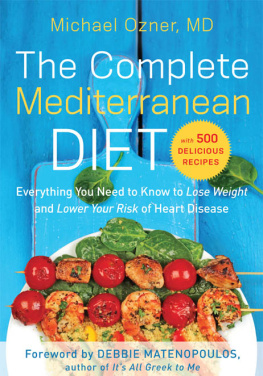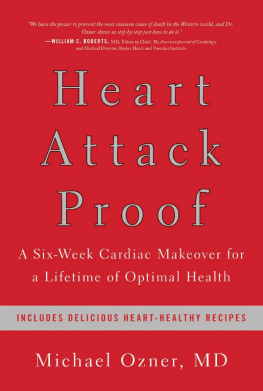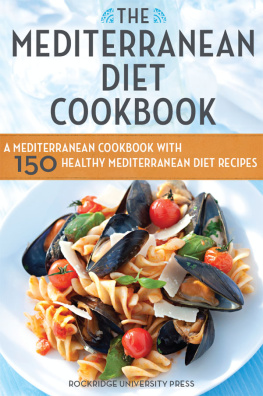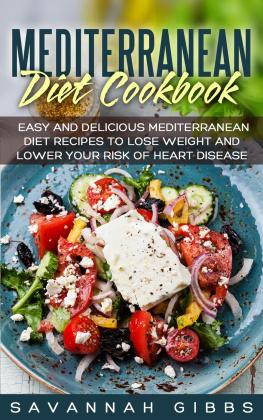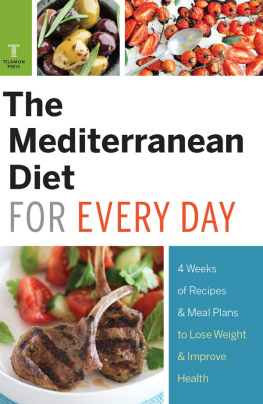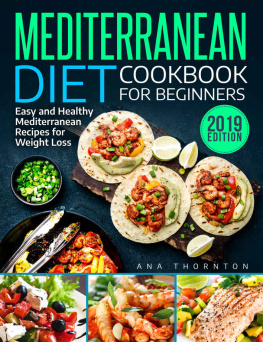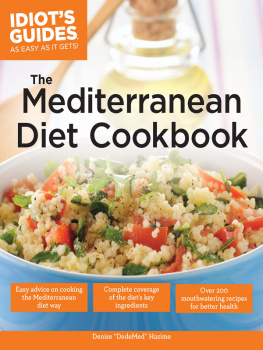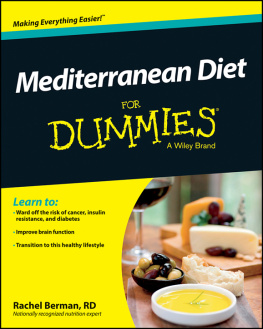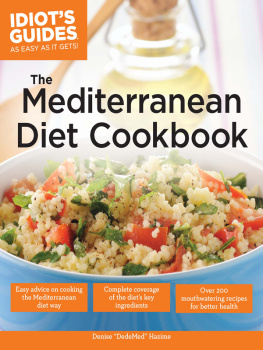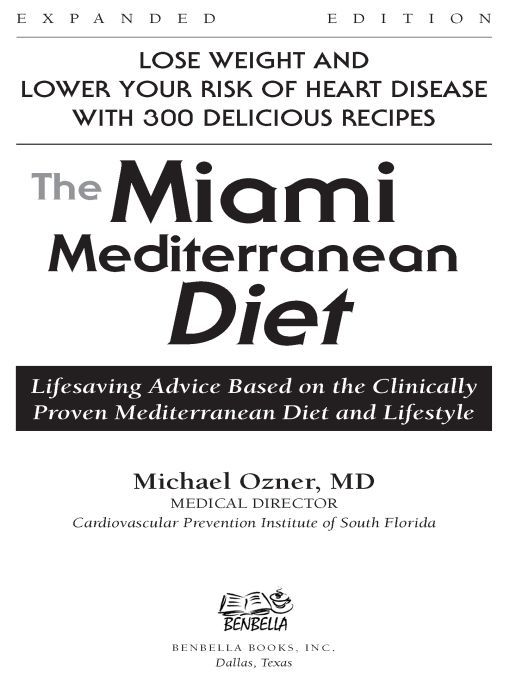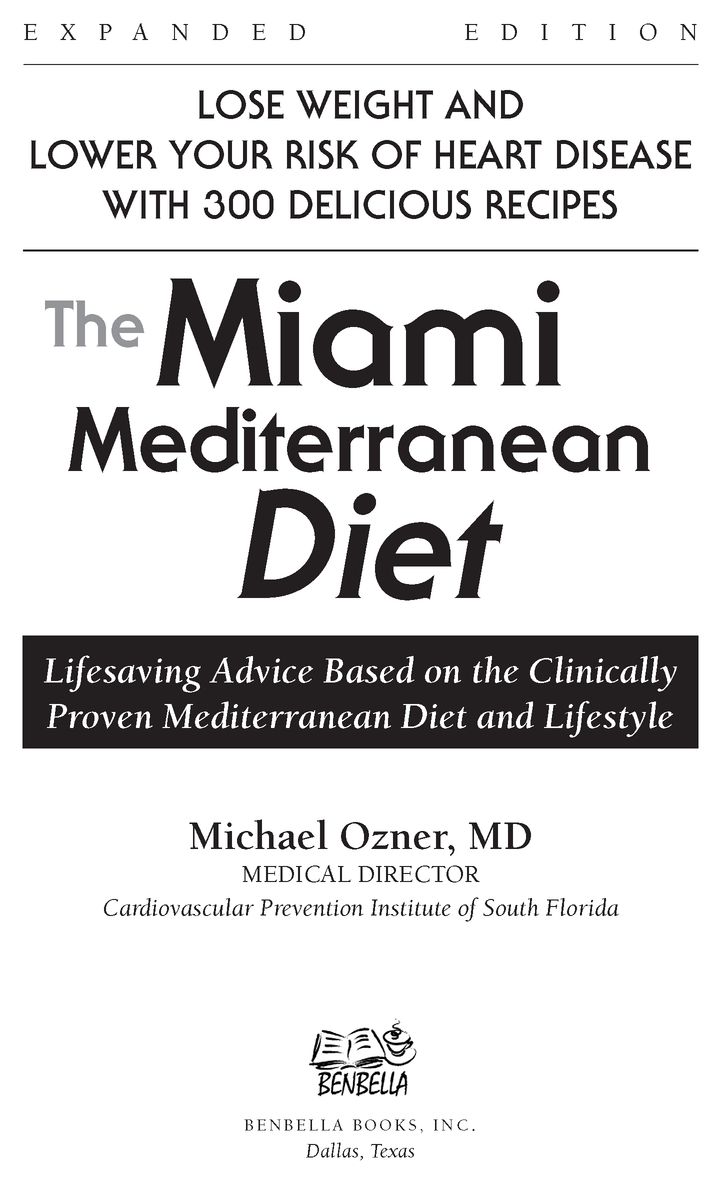Table of Contents
I strongly recommend Dr. Ozners book, The Miami Mediterranean Diet, for anyone who is interested in living a long and healthy life. This book is a concise, no-nonsense approach for heart disease prevention.With so many fad diets that are here today and gone tomorrow, finally there is a clinically proven and sensible approach, as Dr. Ozner provides practical dietary and lifestyle guidelines for defeating heart disease.
BARRY T. KATZEN, MD
Medical Director, Baptist Cardiac & Vascular Institute of Miami
The current medical literature is replete with articles confirming what Dr. Ozner has been advocating for many yearsthat prevention is the best treatment for heart disease. In his book, The Miami Mediterranean Diet, he outlines a strategy that, combined with an exercise program, has allowed me to reduce my weight, my blood pressure, and my cholesterol. I have a greater sense of well-being and I feel that I will live a longer and healthier life.
JERROLD YOUNG, MD
In The Miami Mediterranean Diet, Dr. Michael Ozner not only makes a compelling argument for the importance of the Mediterranean diet and lifestyle for overall health, but gives a comprehensive guide for ways to incorporate this diet into all of our lives. Research has clearly shown that those who follow a life-long Mediterranean diet and lifestyle are giving themselves the best insurance for a healthy life and now Dr. Ozner brings that to our shores.
RANDOLPH P. MARTIN, MD
Director of Noninvasive Cardiology, Emory University Hospital
A valuable resource from preventive cardiologist Michael Ozner providing heart healthy dietary information, sample meal plans, and an exciting array of recipes.
NANETTE K. WENGER, MD
Professor of Medicine (Cardiology),
Emory University School of Medicine
This book is a direct path to the visceral pleasure of well-prepared food and cardiovascular health. The Miami Mediterranean Diet provides a sane alternative to the faddist and extremist diets that lead to short-term weight loss and long-term weight gain.
JOSEPH L. IZZO, JR., MD
Professor of Medicine & Pharmacology, State University of New York at
Buffalo Clinical Director of Medicine, Erie County Medical Center, Buffalo,
New York
I wholeheartedly endorse the Mediterranean diet, a way of eating that has been in existence for thousands of years. The Miami Mediterranean Diet is based on this way of life, encouraging a balanced, well-nourished food plan including whole grains, fresh fruits and vegetables, and lower fat intake. Following Ozners stated food plan, coupled with caloric control and daily exercise, can lead to both weight loss and a healthy heart. The recipes are easy to produce and generate delicious meals; no one would feel deprived adhering to the stated plan.
KAREN LIEBERMAN, PHD, RD
Professor and Chair, the Hospitality College,
Johnson & Wales University, Florida Campus
I have bounced from one diet to another, including the low carb diets. My weight would go up and down on these fad diets and I felt that I was mortgaging my long-term health in order to achieve weight loss. I adopted Dr. Ozners dietary and lifestyle guidelines and I have achieved my goalcontrolled and steady weight loss. In addition, my cholesterol has dropped, my blood pressure has normalized, and I have more energy. I highly endorse this book for anyone seeking to decrease their risk of heart disease and improve their overall health.
PATIENT (CP)
Acknowledgments
I would like to thank my patients and colleagues who have given me the inspiration and motivation to write The Miami Mediterranean Diet.
I am especially grateful to the following individuals who have taken extensive time and effort to review and critique The Miami Mediterranean Diet: Barry T. Katzen, MD, a pioneer in interventional radiology and Medical Director of the Baptist Cardiac & Vascular Institute at Baptist Hospital of Miami; Randolph P. Martin, MD, Director of Noninvasive Cardiology at Emory University in Atlanta; and Karen Lieberman, PhD, RD, Professor and Chair of the Hospitality College at Johnson & Wales University, Florida Campus. I would also like to thank Nanette K. Wenger, MD, and Joseph L. Izzo, MD, for reviewing and commenting on The Miami Mediterranean Diet.
I would like to express my gratitude to all of the nurse educators who share my passion for cardiovascular disease prevention, and who have helped me organize and promote the Wellness & Prevention Program at the Baptist Cardiac & Vascular Institute at Baptist Hospital of Miami. This program provides education and prevention strategies for patients who have heart disease or diabetes and for those with risk factors for cardiovascular disease.
I am also grateful to Glenn Yeffeth, Leah Wilson, and Laura Watkins at BenBella Books for their steadfast guidance and advice.
Finally, and most importantly, I would like to thank my wife, Christine Ozner, RN, who has a special interest in nutrition and Mediterranean cooking and has contributed immensely to the writing and editing of this book.
To my wife, Christine, and my children, Jennifer and Jonathan: You are my heart and soul.
Congratulations! By reading this book and following the principles of the Miami Mediterranean diet and lifestyle, you will begin to take charge of your cardiovascular health.
This book is intended to provide information on cardiovascular disease prevention. However, it is not intended to replace the doctor-patient relationship. I recommend that you discuss all prevention and treatment options with your personal treating physician. Regular office visits between a patient and his or her doctor to discuss cardiovascular prevention strategies provide the optimum approach in the ongoing battle against heart disease.
Foreword
We are at war in the United States of America, and our enemy is quite formidable. It has killed more people than all of the wars which we have previously fought. Every thirty seconds it claims another victim. We have identified this enemy but we have not defeated it.
Its name is cardiovascular disease.
Is there a solution? Can we defeat cardiovascular disease and its manifestations (heart attack, stroke, peripheral vascular disease)?
The answer is yes! First, we must realize that our most effective weapon is prevention, not intervention. Prevention strategies must begin at an early age and continue for life. Proper diet, exercise, stress management, the cessation of smoking, and appropriate medical therapies are the weapons most needed in our ongoing battle against heart disease.


